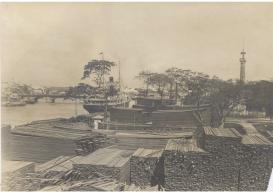Science and the state both have roles in creating and controlling environmental change. This project examines the complex dynamics within the research communities asked to assist and advise governments’ imposition of order on chaotic, yet valuable, natural resources. The field of scientific forestry was designed to plan for long-term stability through management of forest ecology and human use. This research project focuses on the rescaling of forest management techniques and predictions in the American-controlled Philippines, and the larger context of globalized industrial tropical forest management in the twentieth century.
American businesspeople, middle-class Filipinos, biologists, and military officers worked in concert with the goals of US colonial governance to define the Philippines’ forests in terms of American forestry and economics. The presence of American forest managers in remote areas conveyed to local people the occupying government’s ability to control and transform not just the archipelago’s governance but its very environment.
Creating locally determined rules for scientific forest management led to hybrid constructions of American ideas and Philippine realities. Using the forest required translating local Filipino knowledge about wood and trees into a globalized language that was both scientific and commercial. This project thus considers the processes of naming, defining, managing, planning, standardizing, and marketing tropical forest trees by forest managers and scientists.

